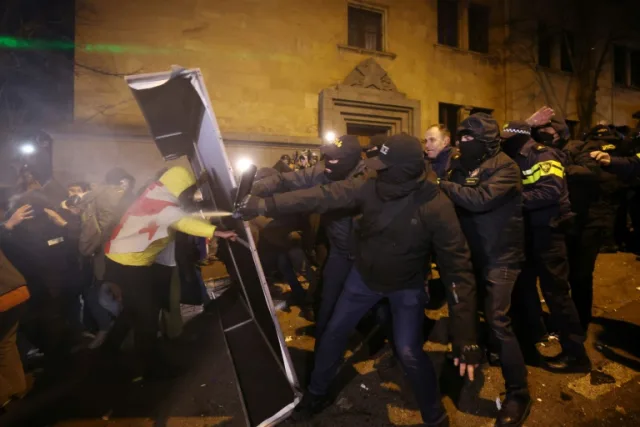
Georgian police on Friday fired water cannon and tear gas on demonstrators, as thousands took to the streets for a second day to protest the government putting off EU membership talks.
The Black Sea nation has been rocked by turmoil since the ruling Georgian Dream party declared victory in October parliamentary elections that the pro-EU opposition decried as falsified.
In a televised address to the nation, pro-Western President Salome Zurabishvili — at loggerheads with the ruling party — said: “The resistance movement has begun… I stand in solidarity with it.
“We will remain united until Georgia achieves its goals: to return to its European path, secure new elections.”
Prime Minister Irakli Kobakhidze’s statement Thursday that Georgia will not seek to open accession talks with the European Union until 2028 ignited a furious reaction from the opposition and two days of protests.
On Friday, AFP reporters saw riot police fire water cannon and tear gas at pro-EU protesters gathered outside the parliament in Tbilisi who tossed eggs and fireworks.
Clashes broke out later between protesters and police, who moved in to clear the area outside parliament, beating demonstrators, some of whom threw objects.
Independent TV station Pirveli said one of its journalists covering the protest was hospitalised with serious injuries after police beat her and a cameraman.
The interior ministry said two of its employees had been injured as “protestors verbally and physically assaulted police officers, throwing various objects and pyrotechnics in their direction”.
“To de-escalate the situation, law enforcement officers have used special measures prescribed by law,” it said.
AFP reporters saw a small fire on the street at the scene of the protest and two Molotov cocktails being thrown.
‘Authoritarian’
In power for more than a decade, critics accuse Georgian Dream in recent years of having moved the country away from Europe and closer to Russia.
Ahead of October’s elections, it pushed through legislation targeting independent civil society and curbing LGBTQ rights, drawing warnings from Brussels.
“Georgian Dream’s self-proclaimed government is doing everything it can to destroy Georgia’s chances of joining the EU,” said one demonstrator, 39-year-old schoolteacher Laura Kekelidze.
“They know their authoritarian rule is incompatible with EU membership,” she told AFP. “But Georgians belong in Europe, and that’s why we are out here in the streets today.”
The former Soviet republic officially gained EU candidate status in December 2023. Polls say 80 percent of the population backs joining the bloc.
But earlier this year, Brussels froze Georgia’s accession process, citing democratic backsliding.
Opposition lawmakers have questioned the results of last month’s parliamentary elections, which gave Georgian Dream a majority.
They are boycotting the new parliament, while President Zurabishvili has sought to annul the election results through the country’s constitutional court.
‘Punitive attack’
Protests were also held in other cities across Georgia on Friday, independent TV station Mtavari reported.
At least four demonstrators were arrested in Georgia’s second-largest city, Batumi, local media reported.
On Thursday, an AFP reporter saw riot police beating peaceful protesters and journalists at the demonstration.
Police said 32 officers had been wounded then and 43 protestors detained “for disobeying lawful police orders and for petty hooliganism”.
European nations and rights groups on Friday expressed concern over the situation.
“Police actions in Tbilisi mark another punitive attack on the right to peaceful assembly,” Amnesty International said.
France, Britain, Ukraine, Poland, Sweden and Lithuania were among the countries to voice concern.
The Council of Europe condemned what it called the “brutal repression”, urging Georgia to remain “faithful to European values”.
Prime Minister Kobakhidze accused the opposition and the EU ambassador to Georgia of distorting his words, and insisted membership in the bloc “by 2030” remains his “top priority.”
Georgian Dream MPs voted unanimously Thursday for Kobakhidze to continue as prime minister, even as the opposition boycotts parliament, which faces a serious legitimacy crisis.
One author of Georgia’s constitution, Vakhtang Khmaladze, told AFP that any decisions made by the new parliament — including Kobakhidze’s nomination — are invalid, because it approved its own credentials in violation of a legal requirement to await a court ruling on Zurabishvili’s bid to annul the election results.
(AFP)
Follow the KOIKIMEDIA NEWS 🗞️ CHANNEL on WhatsApp: https://whatsapp.com/channel/0029VatGuwaGufJ1s73IEk0N
